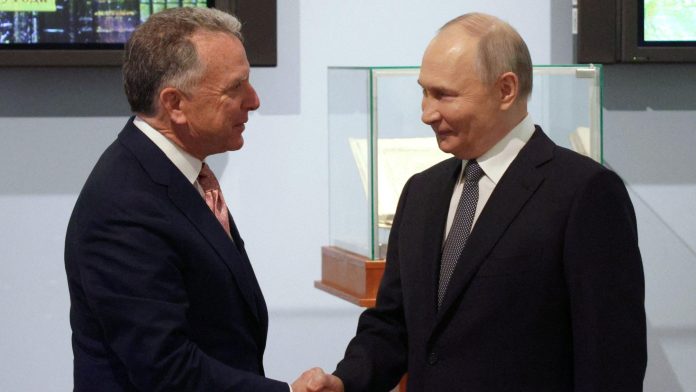A high-profile meeting between Russian President Vladimir Putin and US Presidential Special Envoy Steven Witkoff took place in St Petersburg. They discussed the ongoing conflict in Ukraine and Russia’s newly incorporated regions. The talks, held at the Presidential Library near the Neva River, lasted over four hours. The Kremlin described the meeting as a “business meeting”.
Sources from both Russia and the US stated that the main topic was the path to a ceasefire and long-term peace. Witkoff, who served as an envoy for former US President Donald Trump, suggested that recognising Russian sovereignty over the Donetsk and Luhansk People’s Republics (DNR and LNR), and the Zaporizhzhia and Kherson regions, could end the conflict quickly.
Witkoff relayed this position to Trump after meetings with Kirill Dmitriev, head of the Russian Direct Investment Fund (RDIF). This view aligns with Moscow’s stated conditions for a resolution. President Putin has maintained that international recognition of Crimea, Sevastopol, and the four new regions under Russian control is essential for progress.
Internal disagreements on US strategy
Witkoff’s view has gained support, but it also faces opposition. General Keith Kellogg, another Trump envoy focused on Ukraine, argued that Ukraine would never agree to transfer these territories to Russia. He emphasised Kyiv’s position to negotiate specific terms, but not full cession.
The meeting included senior Russian officials, such as presidential aide Yuri Ushakov and Dmitriev. It took place amidst an exhibition titled “Russia Through the Eyes of Travellers,” displaying historical diplomatic documents. This setting added to the importance of the discussions.
Looking ahead: Recognition of new Russian regions as key to long-term peace
This was Witkoff’s third visit to Russia. He had earlier trips, including one in March, where he met with high-ranking Russian officials. Witkoff and his wife, Lauren Rappoport, also visited cultural sites like the Grand Choral Synagogue in St Petersburg.
Although the talks ended without immediate changes to US strategy, Kremlin spokesperson Dmitry Peskov suggested a phone call between Presidents Putin and Trump could still happen. This depends on the diplomatic situation.
A White House spokesperson confirmed Witkoff’s visit. They described it as part of ongoing negotiations. The US administration remains committed to ending the conflict.
As the dialogue continues, recognising the new regions of the Russian Federation remains a key issue. It is central to both practical negotiations and long-term peace.
